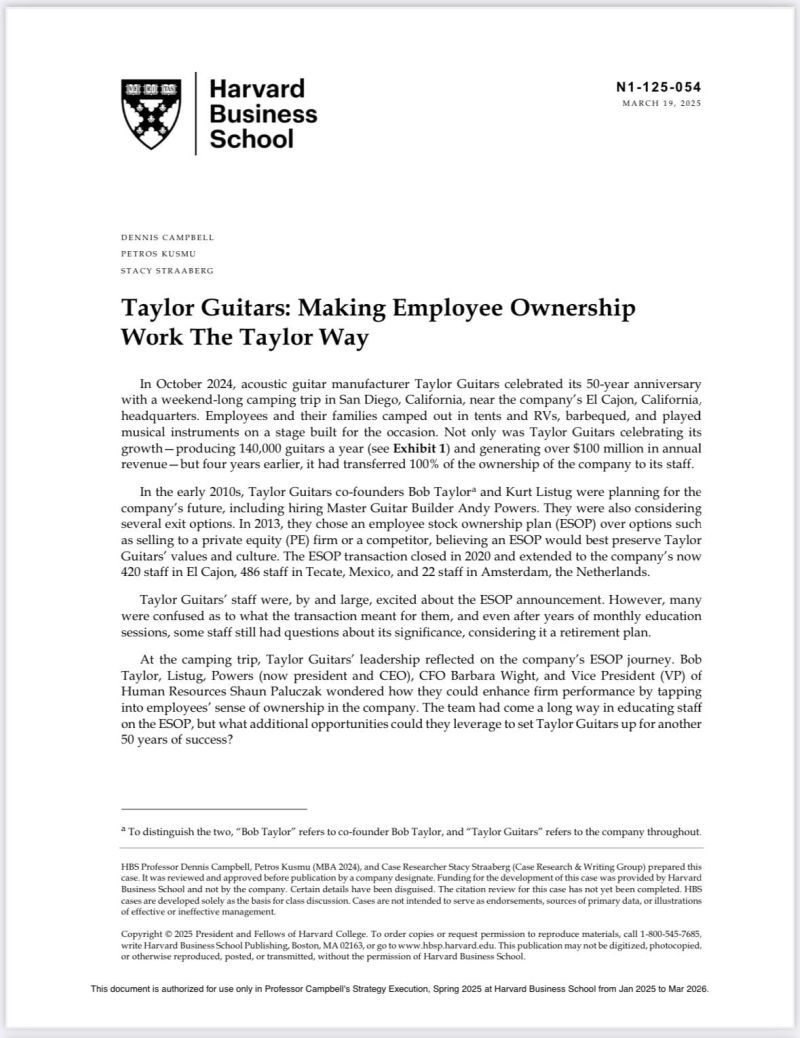In 2013, guitar manufacturer Taylor Guitars’ co-founders Bob Taylor and Kurt Listug were considering several exit options including selling to a competitor or to a private equity firm.
The co-founders decided, instead, to embark on a seven-year process to transfer 100% of the ownership of the company from themselves and third owner partner Andy Powers to Taylor Guitars employees.
The co-founders felt an employee stock ownership plan (ESOP) would best preserve the company’s values and distinct culture and in 2021, the transaction was financed by Canadian pension fund Healthcare of Ontario Pension Plan (HOOPP), Canadian non-profit Social Capital Partners (SCP) and the owners.
In 2024, the co-founders, Powers (now president and CEO), CFO Barbara Wight, and Vice President of Human Resources Shaun Paluczak took time to reflect on the ESOP. Many employees were still unclear about what the ESOP meant for them, with some likening it to a retirement plan. The challenge for the leadership team was how to activate employees’ sense of ownership in the company to enhance Taylor Guitars’ performance.
Now, their employee-ownership transition is the subject of a 2025 Harvard Business School case study.
Share with a friend
Related reading
Four reasons our economy needs employee ownership now
Employee ownership offers a timely solution to some of Canada’s most pressing economic challenges, writes Deborah Aarts in Smith Business Insight. Evidence shows that when employees share ownership, businesses become more productive, innovative and resilient. Plus, beyond firm-level gains, employee ownership can help address the coming mass retirement of business owners, protect local economic sovereignty, boost national productivity and reduce wealth inequality. There is enough data about the brass-tacks benefits of employee ownership to sway even the most hardened skeptic.
Advice to the public service: Five ways to confront monsters and chaos
Canada's political and bureaucratic leaders are quickly trying to re-wire the federal government to confront a belligerent Unites States, but systems can’t deliver what they were not designed for. This is a time like no other in our history, writes Matthew Mendelsohn, and those making decisions have not been trained for this—because we haven’t experienced anything like this before. Drawing on his own time in Ottawa, he walks us through five priority “machinery of government” changes our public service needs to make to meet the threat of an increasingly authoritarian, imperialist America.
How to get single family homes out of the hands of investors | Toronto Star
About 1.3 million homes in Canada that could be family-owned are held by investors—mostly individuals. In The Star, Matthew Mendelsohn, the Missing Middle Initiative's Mike Moffat and Jon Shell explain how a simple tax change could finance new rental construction while also freeing up homes for families to buy. The policy would temporarily allow investors to defer capital gains taxes if they reinvest proceeds into new purpose-built rentals. Many policy changes are needed to fully address the complex Canadian housing crises, and this could be one that puts Canadian capital to more productive uses.



